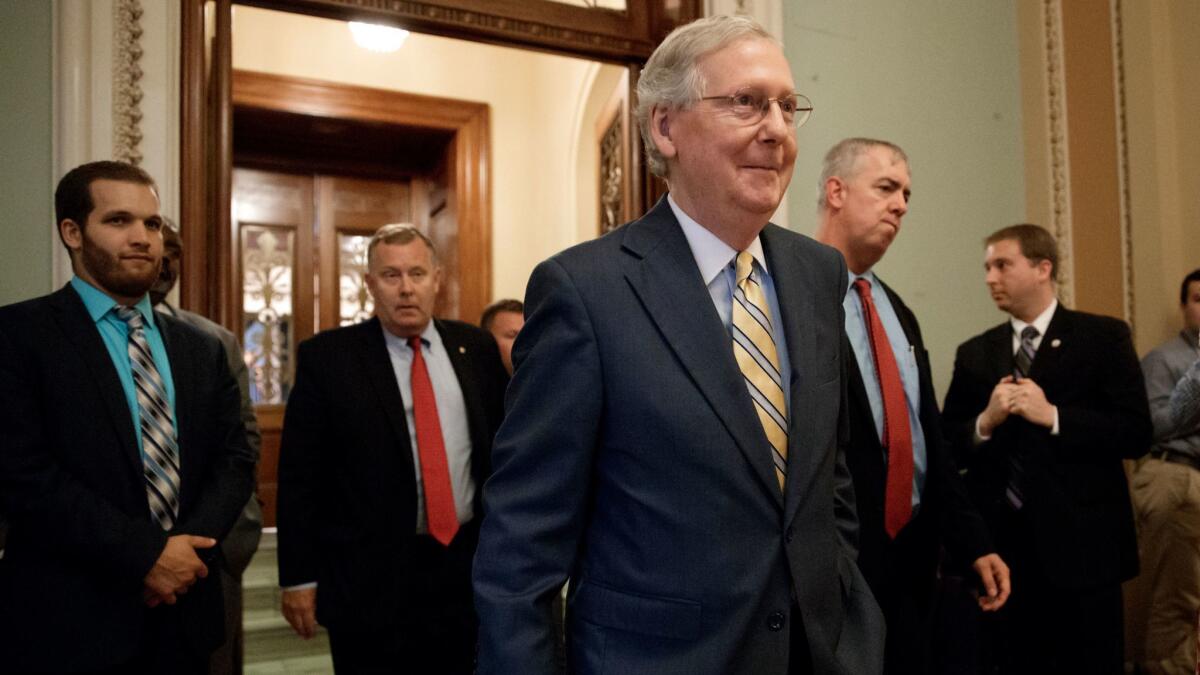Editorial: The new GOP healthcare bill is more conservative and more moderate, and still plain bad

Senate Majority Leader Mitch McConnell (R-Ky.) has done something remarkable to the Republican healthcare bill he’s been trying to steer through the Senate: He’s simultaneously made it more conservative and more moderate. But he hasn’t magically transformed it into a good bill that would make healthcare better or more accessible in this country.
Instead, the new version of the “Better Care Reconciliation Act” would continue to push insurance coverage out of reach for many Americans, particularly the working poor and moderate-income adults with pre-existing conditions. And in a new twist, it would reward insurers financially for offering cheap policies to younger, healthier consumers, pitting those individuals against people who want or need more comprehensive coverage.
It’s tempting to blame the bill’s shortcomings on the secretive, corner-cutting process taken by McConnell (and House Republicans before him). As bad as the process may have been, though, the real issue is the bill’s goals and the ways it tries to achieve them.
The likely outcome is that the bill would quickly make a mess out of the individual markets in most states.
First, Senate Republicans are so eager to rein in federal spending on Medicaid, they’ve proposed budget caps that will gradually, inexorably shift more of the program’s cost onto states. The 2010 Affordable Care Act encouraged states to expand coverage to more disabled and working poor Americans who couldn’t possibly afford private insurers’ premiums; the Senate bill would reverse that move and pressure states to offer thinner coverage to fewer people. And to what end? Those who will be kicked off Medicaid will wind up in hospital emergency rooms, racking up costs that will inevitably be passed on to taxpayers or the insured.
Second, the bill’s architects say they want to reduce insurance premiums for the roughly 20 million Americans not covered by government health programs or large employer health benefits — but their proposal would do so in the short term just for younger and healthier consumers willing to forgo comprehensive coverage. Specifically, the bill would encourage insurers to offer cheap, thin policies to the healthy, which may entice people who don’t really need coverage to sign up anyway. That would theoretically lower insurers’ average cost per customer, helping to hold down premiums in the long run.
That’s the hope. But the likely outcome is that the bill would quickly make a mess out of the individual markets in most states. With no penalty for people who go uninsured — just a six-month waiting period should they ever decide to sign up — the bill could prompt millions of healthy people to stop carrying coverage, driving up premiums even faster. And even if healthy consumers signed up for a cheap, low-value policy, the Senate bill would still shift risks and costs onto Americans with preexisting conditions or who may eventually need expensive treatments not covered by the cheap policies. Based on pre-ACA experience, analysts say, these thin policies are unlikely to cover maternity care, substance abuse treatment and specialty prescription drugs.
In a concession to conservatives, the new version of the bill would roll back more of the ACA by making it easier for insurers to get out from under the law’s requirements, including its protections for those with preexisting conditions and its limits on profits. And in a nod to moderates, it offers insurers that sell thin plans an additional $70 billion over seven years to help offset the cost of offering comprehensive ones, plus $45 billion to help states combat the opioid epidemic. It also would preserve the ACA’s tax increases on high-income Americans and insurance-industry executives, so critics could no longer accuse the GOP of cutting Medicaid to finance tax breaks for the wealthy.
Democrats ought to be just as troubled as Republicans by the rapid rise in premiums in recent years, as well as the withdrawal of several major insurers from some Obamacare exchanges — even if many of the current problems stem from efforts by Republican state officials who opposed the ACA. McConnell may try and sell this bill as a less “mean” version of the House-passed version. But don’t be fooled. It would leave millions of Americans without health insurance and leave many more with low value policies, while doing nothing to slow the rising costs of prescription drugs and medical treatments. But then, that’s a lot harder than slapping a cap on Medicaid and letting insurers sell threadbare policies again.
Follow the Opinion section on Twitter @latimesopinionand Facebook
More to Read
A cure for the common opinion
Get thought-provoking perspectives with our weekly newsletter.
You may occasionally receive promotional content from the Los Angeles Times.






